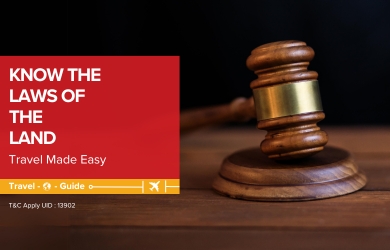

Know the local laws better!
- Introduction
- Local Laws & Rules In A Foreign Country
- Local Culture In A Foreign Land
- Local Ethics In A Foreign Country
- Laws To Abide By In Foreign Country
- Respecting Laws Of A Country As A Traveller
- Running Into Legal Trouble In A Foreign Country
- Finding Help In A Foreign Country
- Things To Avoid When In A Foreign Country
- Take-Home Message
- FAQs
Introduction
International tourism is a brilliant way to explore the different cultures and traditions of various locations in the world. But before you set off on your journey, you have to put great emphasis on the trip-planning phase. It includes everything, from booking hotels and transfers to investing in travel essentials for the trip, learning about the requirements needed to enter a foreign country, things to follow while staying there, etc., these are some of the main factors you should be focussing on.
Continue reading further to find out other important things you should be aware of before going on your desired foreign country trip.
Local Laws And Rules In A Foreign Country
The foreign country you are planning on visiting may have different regional laws and rules than your home country, which can also vary depending on the locality. Here are some general aspects you should be aware of:
- Medication laws: In some foreign countries, certain medications might be prohibited, even if they are prescribed to you by a healthcare professional. So, it is best to get them approved by the destination’s embassy prior to the trip.
- Weapon laws: The local laws regarding weapons can vary from state to state in a foreign country. In some places, carrying even a small knife can lead to legal issues, so research your destination beforehand.
- Driving laws: If you are planning on renting a car or motorbike for your foreign country trip, make sure to learn and follow the local driving laws. It includes things like driving on the correct side of the road, learning about speed limits and traffic signs, necessary documentation to be carried along, etc.
- Photography and videography laws: There are various laws related to videography and photography that you should follow during your foreign country visit. For example, taking pictures of government institutions and vehicles, clicking photos in front of schools, videography on some heritage sites, etc., can be off-limits and a fineable offence.
Local Culture In A Foreign Country
When visiting a foreign country, it is important to learn about and respect its culture. Some important points include:
- Language: You can get away with using English in most foreign countries during your trip. However, in some cases, it is better to learn and use phrases in the regional language to converse with the locals. If you are having a hard time, consider hiring a bilingual tour guide or a translator.
- Religion: Every country has their own religious beliefs, customs and practices. It is best to research this topic prior to the trip so that you can avoid unintentionally doing something disrespectful.
- Food: The local food in a foreign country can consist of original regional recipes and foreign influences. Trying out local dishes is considered one of the best ways to get in sync with a foreign country’s culture.
Local Ethics In A Foreign Country
Another necessary point tourists should consider when visiting a foreign country is its local ethics, for example:
- When travelling in a foreign country, consider smiling more often, especially when talking to others. It leaves a positive impression on the minds of the locals and shows how much you are enjoying your stay.
- Be appreciative of the local hospitality and everything you are offered. Try not to compare anything in a negative sense to what you are accustomed to.
- In your foreign country trip, treat everyone with kindness and have a clear and understanding approach towards the locals and their situations.
Laws To Abide By In Foreign Country
Here are some common laws to abide by when visiting a foreign country for tourism:
- Traffic law: When visiting a foreign country, make sure to follow the local traffic laws to keep yourself and others around you safe. It includes things like pedestrian road crossing, rules and regulations on driving and cycling, do’s and don’ts in a vehicle, etc.
- Dress code: There are specific rules and regulations on dress codes in foreign countries that you must follow. Failing to do so is not only disrespectful but can also be a fineable offence.
- Substance use: Do not, in any way, shape or form, engage with drugs or banned substances in a foreign country. It is not only against the law but can also land you some jail time.
- Drinking law: Always abide by the local laws on public drinking and consumption and purchase of alcoholic beverages.
Respecting Laws Of A Country As A Traveller
Here are some of the main reasons why you should respect and follow the local laws in a foreign country as a traveller:
- One of the main reasons you should follow the local laws in a foreign country is that they apply not only to the locals but also to any visitors travelling from a different nation.
- Respecting and following the local laws of a foreign country can help you stay out of unnecessary legal trouble during your trip.
- Abiding by the local laws during your foreign country visit is also a great sign of respect to the region and helps solidify your impression as a tourist.
- Local laws of a country can sometimes reflect its religion, customs, culture and beliefs, which is why tourists must respect and follow them during their visit.
Running Into Legal Trouble In A Foreign Country
If you find yourself in legal trouble during your foreign country trip, here are some things you can do:
- Let the local authorities know about the situation and offer complete cooperation. Do not try to run away from or lie to the officials because it can be disadvantageous for your case.
- In case you get arrested or detained by law enforcement, seek Consular Access under the Vienna Convention to a representative from the respective Consulate or Embassy of your home country.
- If you find yourself liable for third-party damage or such in a foreign land, inform the insurer of your travel insurance policy, who will help take care of the situation.
Finding Help In A Foreign Country
Depending on your requirement, you can seek help from the following places in a foreign country as a tourist:
- The nearest Embassy or the Consulate of your home country.
- Specialised groups or bodies that offer help to tourists, such as official help desks at major tourist sites of interest.
- For any help, be that general information or law-related queries and complaints seek assistance from the local cops.
- There are various helpline numbers in major foreign countries that offer help to tourists during their visit.
Things To Avoid When In A Foreign Country
Here are some important tips that you should follow when visiting a foreign country for tourism purposes:
- In some counties, police officials can randomly stop you and ask to see your ID and documentation as a standard procedure. Hence, you should always carry your passport and other important papers with you when travelling abroad.
- Being late in certain foreign countries is considered rude behaviour. So, make sure to be punctual and respect others’ time.
- In some foreign countries, you should not mention or talk about certain sensitive topics. It is not only considered disrespectful but can also be against the law. For example, make sure to not talk about Hitler or Nazis when visiting Germany.
- It is always a wise decision to invest in international travel insurance for your trip, regardless of the foreign country you are visiting.
- Do not enter local households or other establishments with your shoes on. In some foreign countries, a strict “no shoes indoors” policy is followed.
- Don’t forget to pack clothes according to the place you are visiting and the time frame of your journey. For example, make sure to pack light and loose-fitted clothes when visiting a foreign country in summer. Similarly, carry rain gear when visiting in monsoon and sufficient warm clothes for a winter visit.
- Avoid travelling to a foreign country for tourism purposes during the peak season, especially if you are not fond of the massive tourist crowd or steep prices.
Take-Home Message
These are some of the things travellers must be aware of when visiting a foreign country for tourism purposes. Proper research of the travel destination is key to enjoying your trip and staying out of any trouble during the process. While on the topic of staying out of trouble, the best way to keep yourself financially secure against unforeseen circumstances is to get international travel insurance for your tour.
FAQs
1. Do the local laws in a foreign country apply to tourists?
Yes, all local laws in a foreign country apply to visitors as it applies to the local residents.
2. Can tourists get detained or arrested for not following local laws in a foreign country?
Yes. Tourists can indeed get detained or even arrested by local officials in a foreign country for breaking or not following local laws.
3. Do I need to carry my passport and ID when travelling in a foreign country?
In some countries, you may be asked to present your passport, ID, and other details to the police, which is a part of the standard procedure. Hence, it is advised you carry them at all times and comply with the authorities as requested.
4. How can tourists stay out of trouble when visiting a foreign country?
Tourists visiting a foreign country must research its local laws and customs prior to the trip and follow them to a tee. This is the best way they can stay out of any trouble. Also, hiring a local guide is recommended, who can help you travel the region and inform you about the things you should and shouldn’t do.
Ensure a worry-free international travel experience with our safety net
KNOW MORE







 Health Insurance
Health Insurance  Travel Insurance
Travel Insurance  Car Insurance
Car Insurance  Cyber Insurance
Cyber Insurance  Critical Illness Insurance
Critical Illness Insurance
 Pet Insurance
Pet Insurance
 Bike/Two Wheeler Insurance
Bike/Two Wheeler Insurance  Home Insurance
Home Insurance  Third Party Vehicle Ins.
Third Party Vehicle Ins.  Tractor Insurance
Tractor Insurance  Goods Carrying Vehicle Ins.
Goods Carrying Vehicle Ins.  Passenger Carrying Vehicle Ins.
Passenger Carrying Vehicle Ins.  Compulsory Personal Accident Insurance
Compulsory Personal Accident Insurance  Travel Insurance
Travel Insurance  Rural
Rural 










